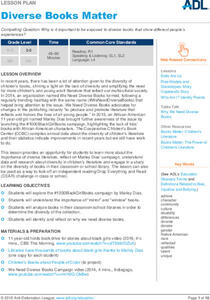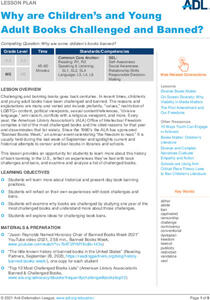Anti-Defamation League
Hair Discrimination and the CROWN Act
The CROWN Act (Creating a Respectful and Open World for Natural Hair) is the subject of the activity that asks groups to research the stories of five different women and share their insights in a jigsaw activity. Participants then craft...
Anti-Defamation League
Teens, Tech, Connect: How Technology Impacts Teenagers' Friendships
To understand their time spent online, class members chart their use of technology during early morning hours, during school, after school, in the evenings, and on weekends. They then read several reports about how social media...
Learning for Justice
Showing Empathy
A short social-emotional learning lesson teaches high schoolers how to show empathy toward others. After completing a short survey that has them assess their understanding of empathy, the class learns specific behaviors they can model to...
Learning for Justice
Standing Up Against Discrimination
Expert groups investigate five teens who stood up against discrimination they faced and then report their findings in jigsaw groups. The class drafts proposals for actions the school could take to stop discrimination.
Anti-Defamation League
Cyberbullying and Online Cruelty: Challenging Social Norms
"Everybody does it!" is often the clarion call to justify cyberbullying. Here's a lesson plan that encourages high schoolers to challenge these behaviors. Participants examine images, watch videos, and engage in discussions designed to...
Learning for Justice
Recognizing Discrimination
Empower scholars to take a peaceful stand against discrimination. The color of their clothes separates learners; then, only some are allowed to go to recess—this sparks a discussion about the concept of discrimination and how they felt...
Anti-Defamation League
Building a Foundation for Safe and Kind Online Communication
Put a spotlight on internet safety with a lesson designed to boost positive online communication. Scholars listen to the story, Yettele's Feathers by Joan Rothenberg, and answer questions. An emoji-themed handout challenges pupils to...
Anti-Defamation League
Nothing Wrong with a Three-Legged Dog: Discussion Guide for Grades 3-5
Scholars study the book, Nothing Wrong with a Three-Legged Dog by Graham McNamee to encourage an antibullying trend in their school and community. Chapters and themes examine bias, coping skills, how to respond to bullying, and being a...
Anti-Defamation League
Say Something: Discussion Guide for Grades 2-4
Empower pupils to stop bullying when they see or experience it with a lesson that showcases the book, Say Something by Margaret Paula Moss. After reading the tale and thoughtfully discussing its characters, they share their own...
Anti-Defamation League
The Name Jar: Discussion Guide for Grades Pre-K–1
A activity spotlights the story, The Name Jar, by Yangsook Choi. After a read-aloud, the class retells the story using puppets or dress-up. They participate in a thoughtful discussion about the story, answer questions relating the book...
Learning for Justice
What is Empathy?
Young scholars examine facial expressions to identify emotions, listen carefully to stories, and choose the appropriate reaction. Partners choose one story to rewrite, showing empathy for others.
Anti-Defamation League
Addressing Hate Online: Countering Cyberhate with Counterspeech
Cyberbullying is the focus of much discussion. Here's a instructional activity that offers suggestions for addressing cyberhate. After groups examine different examples of cyberhate, the class adds their suggestions to a list of ideas...
Anti-Defamation League
"What is it Like to be an Outsider?”: Building Empathy for the Experiences of Immigrants
This lesson highlights the struggles of immigrants and the importance of showing empathy. Beginning with a read-aloud of a book in another language and a poem, scholars take part in a thoughtful discussion. Then, the class examines a...
Anti-Defamation League
On-Screen Diversity: Why Visibility in Media Matters
Characters play a significant role in why we like certain shows and movies but are the characters we watch representing the diverse society in which we live? Scholars examine this question through thoughtful discussion about popular...
Anti-Defamation League
Mo’Ne Davis and Gender Stereotypes
A thoughtful discussion begins a lesson plan about sports and gender stereotypes. After defining stereotypes, scholars highlight how gender stereotypes often have adverse effects. To break through those stereotypes, the class gets to...
Anti-Defamation League
Role Models and Stereotypes: Misty Copeland's Story
A lesson points the spotlight at Misty Copeland, the first African American Principal Dancer. A thoughtful discussion prompts pupils to think of their career aspirations and identify ways role models and stereotypes influence young...
Anti-Defamation League
Diverse Books Matter
A campaign by Marley Diaz sheds light on the importance of diverse books. Scholars explore the campaign and identify "window" and "mirror" books. They look closely at their library and classroom bookshelves and reflect on why diverse...
Overcoming Obstacles
Public Assessment
How'd we do? Class members consider different forms of public assessment and select a method or methods they will use to craft a formal public assessment of their Service Learning project. Participants then present their assessments.
Overcoming Obstacles
Introduction to Service Learning
Introduce scholars to Service Learning with a lesson that distinguishes between Service Learning and Community Service. After reading about others involved in Service Learning, class members generate a list of issues in their communities...
Overcoming Obstacles
Handling Peer Pressure
The second lesson in the "Looking to the Future " module provides participants with strategies for handling peer pressure, especially when peers urge behaviors that go against one's values, beliefs, and family rules.
Anti-Defamation League
Why are Children’s and Young Adult Books Challenged and Banned?
September's "Banned Books Week" brings attention to the number of books that are challenged, censored, or banned each year. After watching a video about banned book week, reading articles about the history of book banning, and examining...
K20 LEARN
But What About Me?: Teaching Perspective In The Social Studies Classroom
How would the story of the discovery of America be different if indigenous people told it through their eyes? Individuals compare the conventional account of this moment in history to an account given by one of the native peoples. After...
Overcoming Obstacles
Identifying Emotions in Conflicts
The takeaway from the second lesson plan in the Resolving Conflicts module is that "conflict is like an iceberg" in that we only see a small portion of what's involved in conflicts. Participants learn to identify the many unseen feelings...
Overcoming Obstacles
Understanding Conflicts
The Resolving Conflicts module begins with a lesson about tolerance and learning to appreciate differences among people. Through a series of activities and games, middle schoolers learn that conflicts arise when people have opposing...

























